That remarkable woman Eleanor Roosevelt (1884 – 1962) lived in the White House for more than twelve (12) years, and she made full use of the opportunities it offered her, unlike most of the others. Eleanor was content with neither rose gardens nor chiding the victims as other First Ladies have been. Indeed, she might be the only one who deserves that title – First Lady. I class this as Presidential reading.
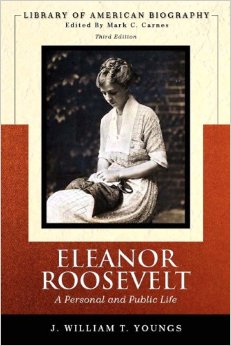
Privately, Franklin called her ‘Public Energy Number One,’ for her readiness to take up any good cause. The press frequently referred to her as ‘Eleanor Everywhere,’ for the whirlwind of activity she was. Not only did she take up causes but she went where they were to see for herself. Of course, it would have been a different story without Franklin, but as we shall see, she contributed a great deal to his achievements, too.
This is a biography, though to this reader somewhat uneven in its execution. On that more later. For now the main game: Eleanor was the daughter of Elliot Roosevelt, a brother of Teddy Roosevelt and Anna Hall Livingston, whose great great grandfather administered the oath of office to the first President of the United States, George Washington. Both sides of the family were well off but not among the astronomically rich Astors, Morgans, Hills, Gettys, and Rockefellers. She was a fifth cousin once removed of Franklin, though I do not quite know what that means. That name Roosevelt is from the Dutch who settled along the Hudson River Valley before the English pushed the Netherlands out.
She grew up comfortable in the small world of the Gilded Age, think of the novels of those superlative chroniclers of that time, place, and class, Edith Wharton and Henry James.
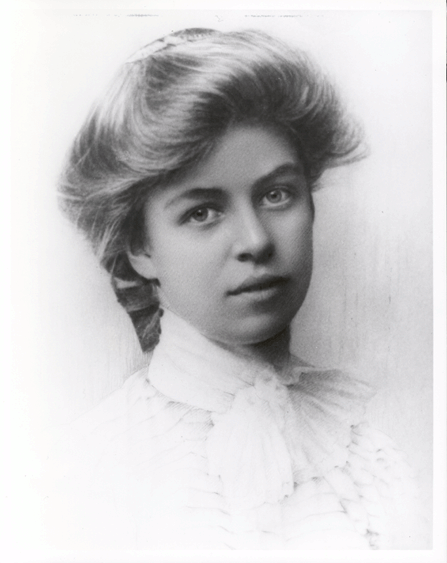 Eleanor in her late teens.
Eleanor in her late teens.
Her mother was very religious and her father an alcoholic wastrel. Because he was mostly absent the young Eleanor idealized her father while receiving little affection from her mother who was too busy praying. She had two brothers, one who died in infancy and another who followed in his father’s footsteps. Her mother died of diphtheria when Eleanor was but six years old and her father drank himself to death three years later. Eleanor was placed with grandparents along with her surviving brother in a large household where she was the last and least. Note that when she married Franklin, the sitting President, Teddy Roosevelt acted as the father of the bride.
In both her paternal home and in the grandparents’ home, the servants all spoke French. That was evidently was the done thing at the time. The servants looked after the children and so Eleanor grew up bilingual and from that derived a lifelong interest in languages. In her teens the family sent her to a finishing school in England for four years. This school emphasized art and culture, and was conducted completely in French. Eleanor excelled there. She travelled to France, Italy, Spain, and Germany on school field trips. When she and Franklin travelled Europe on a long honeymoon she showed him around and he relished her knowledge and appreciation of fine art and history.
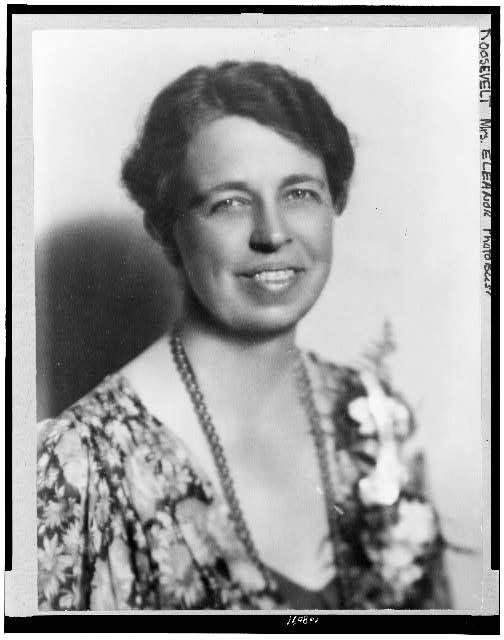 Eleanor the Washington hostess.
Eleanor the Washington hostess.
Franklin advocated female sufferage in his first campaign for the state senate. This surprised Eleanor and she accepted the idea out of loyalty and duty as a wife. She also, in those early days, practiced the snobberey, anti-semtism, and racism of her social origins, whereas Franklin did not. Again she followed him out of duty. Of course, later she surpassed him on these counts but he led the way at the start. One of the very affecting features of this book is the unfolding of Eleanor’s moral growth.
During World War I and after it was Franklin who insisted they visited wounded, injured, and dying sailors in hospital, he being Assistant Secretary of the Navy, but once there, it was Eleanor who stole the show. Even in those days of her callow youth, one observer said that she somehow transmitted good will to the men she touched and spoke to. Franklin had the wit to step back and let the small miracles happen. The observer by the way is that man whose name is forever linked with FDR, Louie Howe. Though she first despised Louie for many wrong reasons, he was working class and its showed and for a time she thought him Jewish, but in time they established a lasting rapport.
Franklin was inspired by Teddy Roosevelt and the state senate was a start. Two years later he ran for governor touting female suffrage, war on Tammany Hall, and urban renewal. To remind readers of the time and place, Franklin drove a motor car in the campaign, and he was the first to do that in New York state. He won and off they went to Albany.
The burdens on Eleanor were both the usual ones for a wife at the time and unusual ones, too. She five children in rapid succession and in this account was not a particularly loving mother. Moreover, there were the duties of a political wife. Staying awake through the speeches, attending every function, entertaining guests at home four or five nights a week, and Franklin brought home all sorts, from factory foremen, to Supreme Court judges, Jews, socialists, bankers, journalists, and all. He is only a supporting player in this book, but he seems entirely free of the prejudices of his background, all the more surprising since his mother was an exemplar of every prejudice going, and he and she were inextricable.
Eleanor learned to manage the demands, and indeed, did it so well that in time other political wives asked her advice on how to cope with children, absent husband, unexpected guests, numbing after dinner speeches, handshaking and handshaking and handshaking. When Franklin went to the Navy Department in Washington her linguistic and cultural assets came into their own. Here Franklin was more likely to bring home an Italian diplomat or a French banker, than a Jewish garment worker or an Irish radical, and the multilingual Eleanor (French, Italian, and some German) was always a hit.
In addition to all the above, Franklin more or less pushed her out the door to create a public profile, starting with the Junior League to teach reading in New York City slums and then the League of Women Voters to educate women to vote as they saw fit not as their husbands did. Ouch! But once she got a toe in those waters she found them to her liking.
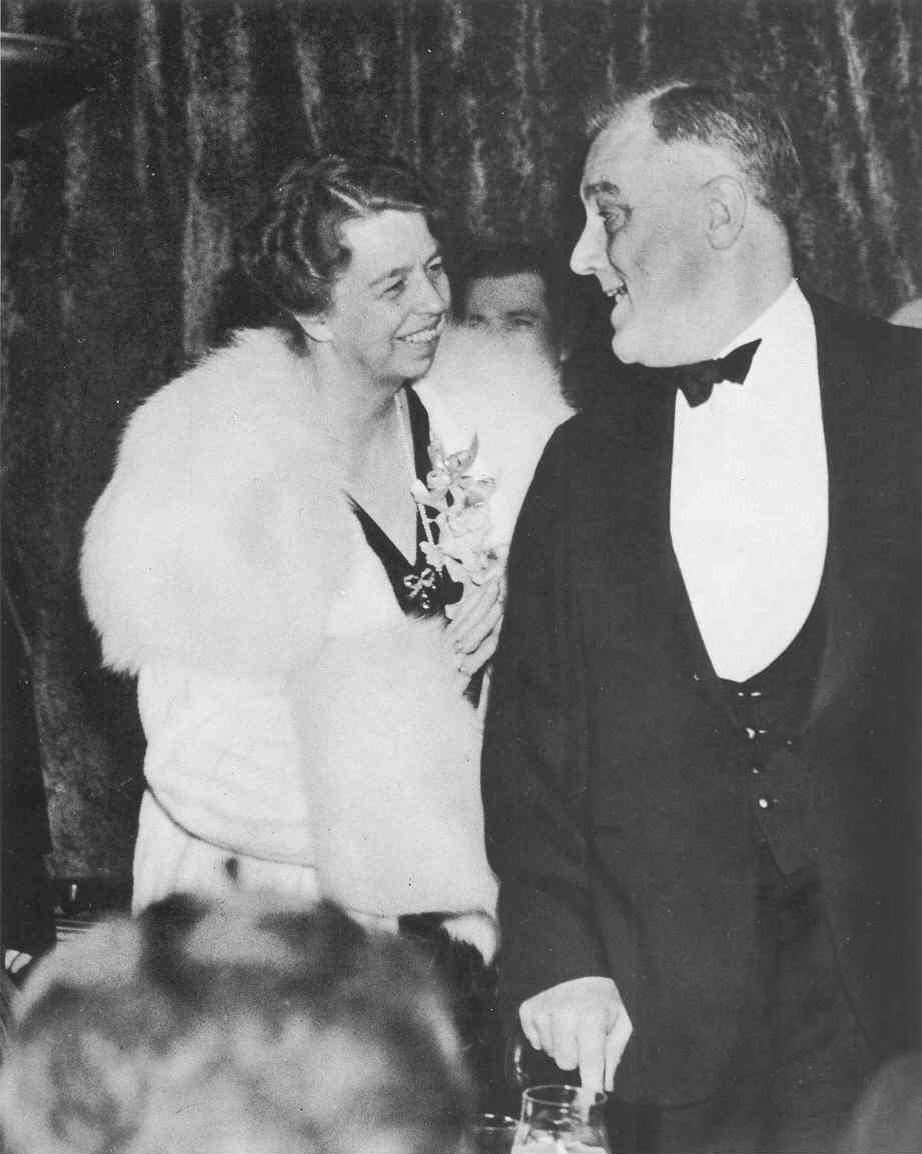 The two of them in 1936
The two of them in 1936
Then, at 39, that active sportsman Franklin Roosevelt lost the use of his legs, literally overnight. There were long bouts of painful therapy. Ever more responsibilities fell to Eleanor, first in caring for Franklin, and most importantly keeping his spirits up, which she did by challenging him, e.g., walk down the drive way – that took him three years of trying to achieve it, wearing twenty pounds of braces, swinging his dead legs from the hips. She is credited with driving him to run for Governor. He did, and thanks largely to the support of Al Smith, he won.
Eleanor became, in addition to everything else, Franklin’s eyes and ears. She did the usual meet-and-greets, but also inspections of workhouses, asyla, prisons, school, hospitals. She took the inspecting seriously and found many deficiencies, all reported to Franklin. These reports led to changes and that emboldened her to work even harder. She continued doing this when Franklin was elected president. Indeed she clocked up 25,000 miles in the Pacific during World War II visiting the troops. One admiral said a visit from Eleanor was worth ten USO shows to lift morale. She made in Melbourne, Sydney, and Brisbane on this tour, as well as Pacific Islands being bombed by the Japanese. The descriptions of Eleanor in hospital wards, evacuation camps, and ship infirmaries full of wounded and dying men is powerful. Those experiences made her an early and loud advocate of the United Nations. By the way, all of the Roosevelt sons were in the armed forces at the time and came under fire. (Sidebar: Teddy Roosevelt’s son, Theodore Roosevelt III, a general, died on Omaha Beach on 6 June 1944. Not the cosseted presidential offspring we have seen of later.)
All the while she published a newspaper column every day, never missing a deadline, typing all the copy herself on a battered Smith-Corona. The pay she donated to a children’s home founded by her grandfather.
Needless to say all this good work infuriated the Tea Parodists of the day who were sure she was a Jew, a Negro, a Communist, an alien, and, worst of all, a woman …! The vitriol poured on her exceeds even that today poured onto Barry O’Bama. But some of the earliest Gallup Polls show her approval ratings consistently above 66%, sometimes ahead of Franklin on that crude index.
At the beginning Franklin led her political development, but later she led his on civil rights and the rights of dispossessed, and women.
When he died, she retired, too, briefly but soon enough she was invited to speak at fundraising events for charities, war bonds, civil rights, and then there was the United Nations’ Universal Declaration of Human Rights, which she alone made happen in two year – yes, two years – of committee meetings with the most intractable committee one can imagine (far beyond the Unbelievables of my experience). That is an impressive achievement. President Truman appointed her and the leader of US delegation gave her, what he thought was a pointless, trivial, and impossible job – the Declaration. No one remembers that leader any more, but everywhere today people speak of human rights, tracing back to Eleanor Roosevelt. Take that!
In 1961 President Kennedy made her chair of the first Commission on the Status of Women, an assignment she attacked as she always did: full tilt. Age wearied her and she died in 1962, an event I can remember.
There is much more to the story to be read in this or in one of the many other biographies, or in her own writings.
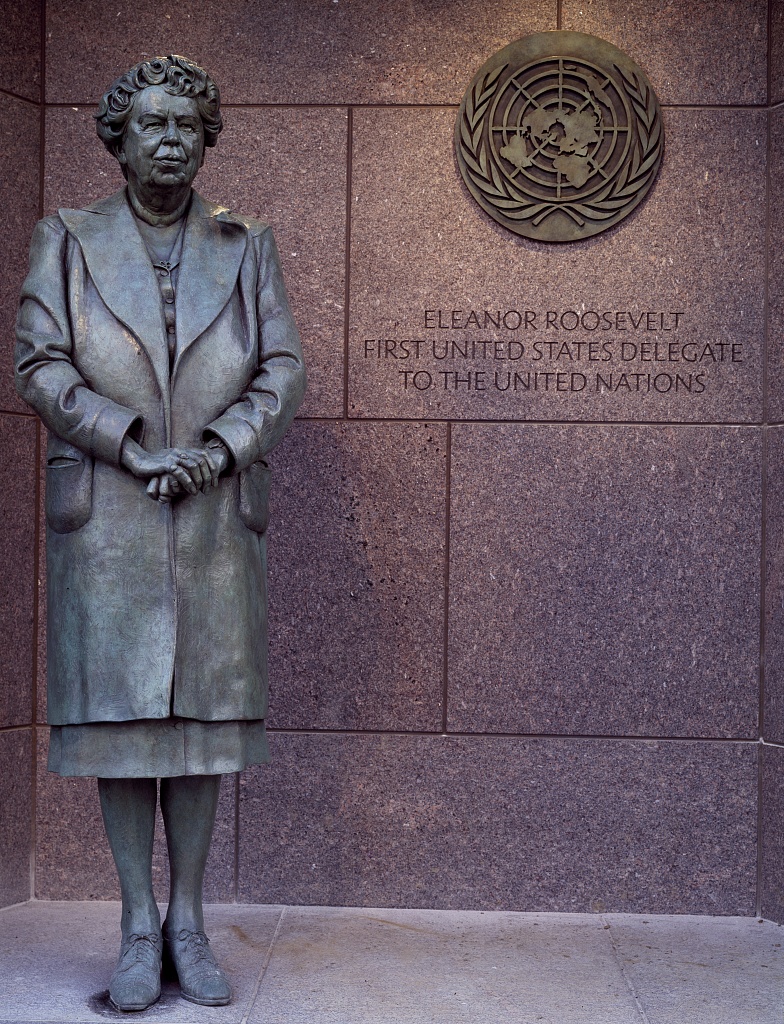 She alone of First Ladies has a statue in Washington, D.C. Take that Nancy Reagan.
She alone of First Ladies has a statue in Washington, D.C. Take that Nancy Reagan.
I said above that the book was ‘uneven’ because it lavishes page after page on the marriage ceremony of Eleanor’s parents and passes virtually in silence the births of her children. It invokes the Dolomites during her honeymoon with Franklin in lyrical passages and skips lightly over crucibles like the death of her brother in 1941. Yes, it does deal with the sexual relations with a laudable reticence and decency.
Skip to content
